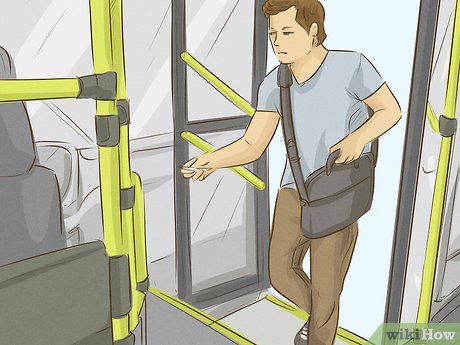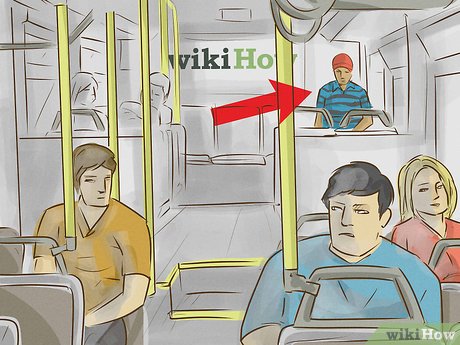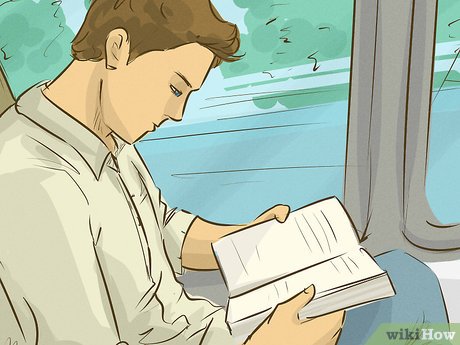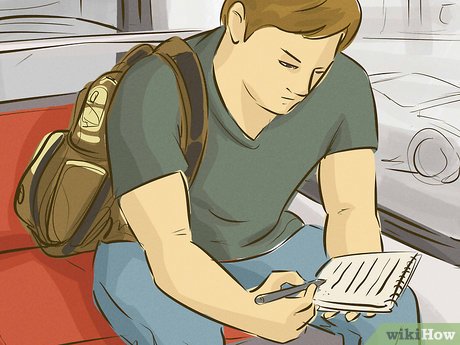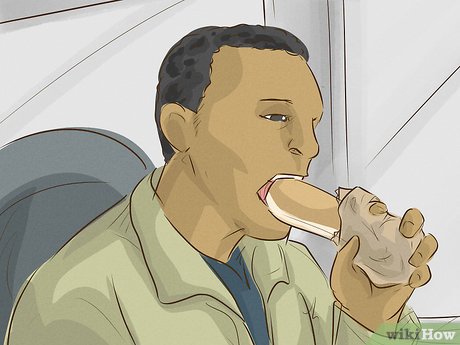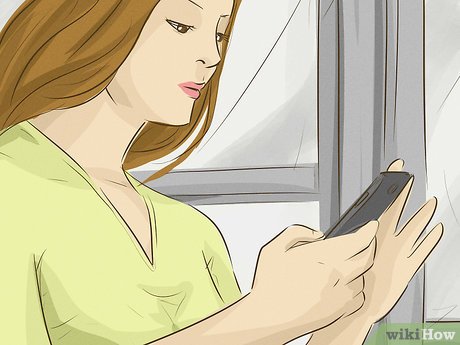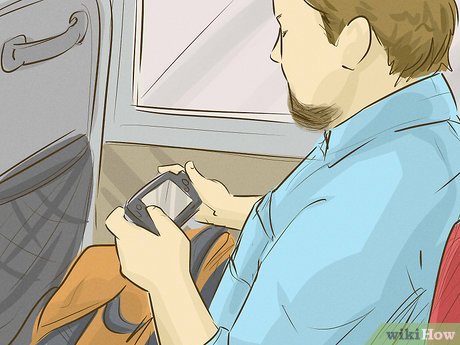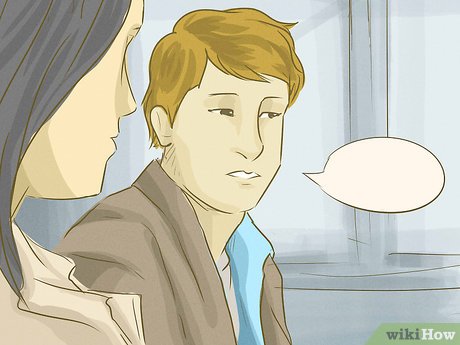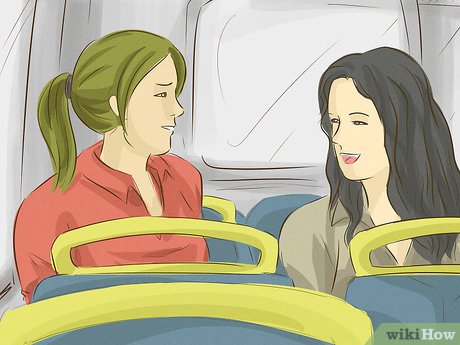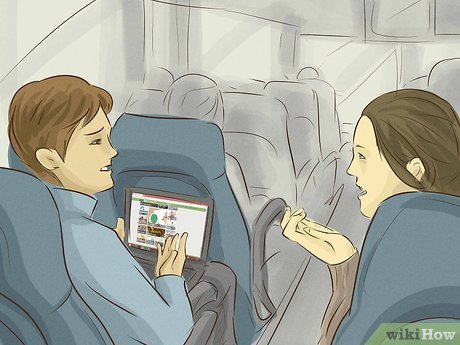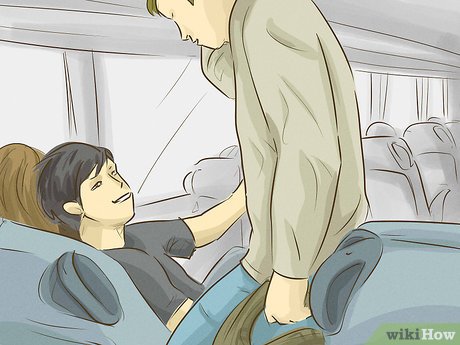How to Avoid Conversation on Public Transportation
Method 1 of 3:
Setting Yourself Up for Success
-
 Move quickly. When you enter, walk directly over to a seat without lingering. Don't pause to look at other passengers or make eye contact. When you move quickly, you will appear focused and busy, thus discouraging interaction. If you take your time and look around, you are likely to make yourself appear more available.
Move quickly. When you enter, walk directly over to a seat without lingering. Don't pause to look at other passengers or make eye contact. When you move quickly, you will appear focused and busy, thus discouraging interaction. If you take your time and look around, you are likely to make yourself appear more available. -
 Sit away from people. Strategically seating yourself is a great way to avoid interaction. Find a seat that is away from other passengers. Especially try to avoid sitting across from someone else whenever possible, because people sitting across from you are most likely to strike up a conversation. Try to find a quiet corner somewhere in the back where you won't be bothered.[2]
Sit away from people. Strategically seating yourself is a great way to avoid interaction. Find a seat that is away from other passengers. Especially try to avoid sitting across from someone else whenever possible, because people sitting across from you are most likely to strike up a conversation. Try to find a quiet corner somewhere in the back where you won't be bothered.[2]- Scope out the bus or train while you are waiting in line. Pay attention to the empty areas so that you can move quickly to them. Also notice which areas are filled with people and be sure to walk right past any of these.
- Preferably find a place near the back. If you sit near the front, even if it is empty, passengers who enter later will be more likely to sit there.
-
 Put your coat or bag on the seat next to you. If there are several empty seats, place your bag or jacket on a seat near you to discourage anyone from sitting there. New passengers are much more likely to simply take an empty seat rather than to ask you to move your things. They might even assume that the seat is saved for someone.[3]
Put your coat or bag on the seat next to you. If there are several empty seats, place your bag or jacket on a seat near you to discourage anyone from sitting there. New passengers are much more likely to simply take an empty seat rather than to ask you to move your things. They might even assume that the seat is saved for someone.[3] -
 Look away. When you sit down, make sure to keep to yourself, avoiding eye contact. If you make eye contact with other passengers, you will give the impression that you are open to interacting. It is best to either look down, look out the window, or you can even rest your head against the window and close your eyes. People will think you are sleeping and will hesitate to interrupt you.[4]
Look away. When you sit down, make sure to keep to yourself, avoiding eye contact. If you make eye contact with other passengers, you will give the impression that you are open to interacting. It is best to either look down, look out the window, or you can even rest your head against the window and close your eyes. People will think you are sleeping and will hesitate to interrupt you.[4] -
 Close off your body language. If you hunch over slightly and cross your arms while looking down, you will look closed off, thus deterring conversation. People will recognize that you don't desire to talk. If you sit up with good posture and are looking eye level with others, you appear open and available to them.[5]
Close off your body language. If you hunch over slightly and cross your arms while looking down, you will look closed off, thus deterring conversation. People will recognize that you don't desire to talk. If you sit up with good posture and are looking eye level with others, you appear open and available to them.[5] -
 Don't smile. Try to look like you are focused on something else or deep in thought. Do this by keeping your mouth in a neutral position and press your eyebrows slightly down. A focused facial expression will give the impression that you are busy and want to keep to yourself. If you smile and look happy, you will naturally invite people to talk to you. You don't need to look angry, just try not to look too friendly.[6]
Don't smile. Try to look like you are focused on something else or deep in thought. Do this by keeping your mouth in a neutral position and press your eyebrows slightly down. A focused facial expression will give the impression that you are busy and want to keep to yourself. If you smile and look happy, you will naturally invite people to talk to you. You don't need to look angry, just try not to look too friendly.[6] -
 Wear a hat. This can block your eye line from people, which will make them less likely to talk to you. A baseball cap with the brim slightly over your eyes will close you off from those around you. They will be less likely to talk to someone that they can't see well, especially because eye contact is generally a precursor to conversation.
Wear a hat. This can block your eye line from people, which will make them less likely to talk to you. A baseball cap with the brim slightly over your eyes will close you off from those around you. They will be less likely to talk to someone that they can't see well, especially because eye contact is generally a precursor to conversation.- If it is winter, you could even bundle up with a scarf. Anything that hides your face a bit will make it harder for people to talk to you because they won't be quite sure who they are talking to.
Method 2 of 3:
Engaging in Other Activities
-
 Listen to music. Nothing says you are unavailable quite like having headphones on. Wear over-the-ear headphones so that people are sure to see them. Earbuds work too, but aren't as effective because they can be difficult to see. Music is great for stopping conversation because it restricts your hearing. People will be much less likely to talk to you because they will assume that you can't hear them well. You would have to remove your headphones to have a good conversation, which makes it difficult for people to talk to you.
Listen to music. Nothing says you are unavailable quite like having headphones on. Wear over-the-ear headphones so that people are sure to see them. Earbuds work too, but aren't as effective because they can be difficult to see. Music is great for stopping conversation because it restricts your hearing. People will be much less likely to talk to you because they will assume that you can't hear them well. You would have to remove your headphones to have a good conversation, which makes it difficult for people to talk to you.- This tip works even if you don't feel like listening to music. You can simply wear your headphones without music and people will assume that you are listening to music.
- If someone does try to talk with you while you are wearing headphones, you can say something like, "I'm sorry, I can't hear you."
-
 Read a book. This shows that you are occupied and makes the other person decide whether what they have to say is important enough to interrupt you. This also demonstrates your lack of interest because you are both looking down and engaging in another activity. It also gives you a good way out of a conversation on the off chance that they do interrupt you. You could say something like, 'I'm sorry but I need to get back to my book now. I'm dying to know what happens next!' The other person will likely accept this and allow you to go back to reading.
Read a book. This shows that you are occupied and makes the other person decide whether what they have to say is important enough to interrupt you. This also demonstrates your lack of interest because you are both looking down and engaging in another activity. It also gives you a good way out of a conversation on the off chance that they do interrupt you. You could say something like, 'I'm sorry but I need to get back to my book now. I'm dying to know what happens next!' The other person will likely accept this and allow you to go back to reading.- Sometimes this can backfire, for example, if someone else really likes to read and wants to ask you about your book. In case this happens, keep your responses brief to show that you aren't interested in talking about your book, but prefer to read it. If they don't get the hint, you can always say something like, 'It was great talking with you but I'm going to return to my book now. I really want to finish this chapter.' If the other person is a reader, they will likely understand.
-
 Write. Bring a notebook and spend time journaling or writing. You could also type something on your computer or tablet. This will help ward off unwanted conversation because it shows people that you are busy and are working on something. It will also help you to avoid eye contact. If someone does try to ask you about your writing, you can say something like, 'I'm writing a piece for my class and I really need to finish it.' They will likely let you get back to your work.
Write. Bring a notebook and spend time journaling or writing. You could also type something on your computer or tablet. This will help ward off unwanted conversation because it shows people that you are busy and are working on something. It will also help you to avoid eye contact. If someone does try to ask you about your writing, you can say something like, 'I'm writing a piece for my class and I really need to finish it.' They will likely let you get back to your work. -
 Eat something. Have a snack while you are riding public transportation. It's quite difficult to talk with a full mouth. If someone interrupts you mid bite, they will have to wait for you to chew and swallow, which makes for a slow and frustrating conversation. You can even exaggerate this a bit and take a long time chewing before you respond, then immediately take another bite. They will likely give up and find someone else to talk to.[7]
Eat something. Have a snack while you are riding public transportation. It's quite difficult to talk with a full mouth. If someone interrupts you mid bite, they will have to wait for you to chew and swallow, which makes for a slow and frustrating conversation. You can even exaggerate this a bit and take a long time chewing before you respond, then immediately take another bite. They will likely give up and find someone else to talk to.[7]- Try eating an apple. You can take big bites and chew slowly so that people see you aren't able to talk.
-
 Pray or meditate. Spend some time with God or take a moment to clear your mind. People are less likely to bother you if you are engaged in a spiritual activity. To make sure that they know not to bother you, close your eyes and fold your hands. The other passengers should leave you alone.
Pray or meditate. Spend some time with God or take a moment to clear your mind. People are less likely to bother you if you are engaged in a spiritual activity. To make sure that they know not to bother you, close your eyes and fold your hands. The other passengers should leave you alone. -
 Look at your phone. If you are busy texting someone or using an app or checking social media on your phone, you will be looking down and avoiding strangers. If someone does interrupt you, you can give a quick answer, like 'yes,' and then get right back to your phone to show that you aren't available to talk.
Look at your phone. If you are busy texting someone or using an app or checking social media on your phone, you will be looking down and avoiding strangers. If someone does interrupt you, you can give a quick answer, like 'yes,' and then get right back to your phone to show that you aren't available to talk. -
 Play a game. Bring a handheld game console and play a game. Games often require a lot of focus, so it will be difficult for you to talk and play at the same time. Handheld games are generally for a single player, so you are doing something that no one else can join. This will help them to see that you aren't interested in connecting with them right now.[8]
Play a game. Bring a handheld game console and play a game. Games often require a lot of focus, so it will be difficult for you to talk and play at the same time. Handheld games are generally for a single player, so you are doing something that no one else can join. This will help them to see that you aren't interested in connecting with them right now.[8] -
 Take a nap. When in doubt, take a nap. It is always awkward to wake up someone who is sleeping, especially if you don't even know them. If you don't feel safe sleeping on public transportation, you can simply close your eyes. No one will know the difference and they will definitely hesitate to disturb you. This shows people that you are completely unavailable for talking.[9]
Take a nap. When in doubt, take a nap. It is always awkward to wake up someone who is sleeping, especially if you don't even know them. If you don't feel safe sleeping on public transportation, you can simply close your eyes. No one will know the difference and they will definitely hesitate to disturb you. This shows people that you are completely unavailable for talking.[9]
Method 3 of 3:
Deflecting Conversation
-
 Give short answers. If someone asks you your name, you can say, 'I'm Bob.' But don't reciprocate the question, or you will give them the impression that you are interested in conversing. If you ask them questions or start adding a lot to the conversation, the person will assume that you are enjoying the conversation and will continue it. To show that this isn't true, it is important that you don't engage with them beyond short answers.
Give short answers. If someone asks you your name, you can say, 'I'm Bob.' But don't reciprocate the question, or you will give them the impression that you are interested in conversing. If you ask them questions or start adding a lot to the conversation, the person will assume that you are enjoying the conversation and will continue it. To show that this isn't true, it is important that you don't engage with them beyond short answers. -
 Don't look at the other person when you respond. If you turn to them while answering and look them in they eye, this will show interest and will forge a connection with them. If you continue with your activity and don't look up while answering, they will feel like you aren't really connecting, which makes for a dissatisfying conversation. This should cause them to stop and try talking with someone else instead.
Don't look at the other person when you respond. If you turn to them while answering and look them in they eye, this will show interest and will forge a connection with them. If you continue with your activity and don't look up while answering, they will feel like you aren't really connecting, which makes for a dissatisfying conversation. This should cause them to stop and try talking with someone else instead. -
 Exit the conversation gracefully. After they have talked for a bit, if they aren't getting the hint and aren't aware that they are having a one-sided conversation, gracefully end the conversation. Be respectful and direct. When there is a pause in the conversation/soliloquy, you could say something like, 'It's been nice hearing all about your family, Mary, but I actually have some work I need to get done now. Take care.' This shows that you heard them and listened, but you simply aren't able to talk. The other person should respect this and allow you to do what you want to be doing.[10]
Exit the conversation gracefully. After they have talked for a bit, if they aren't getting the hint and aren't aware that they are having a one-sided conversation, gracefully end the conversation. Be respectful and direct. When there is a pause in the conversation/soliloquy, you could say something like, 'It's been nice hearing all about your family, Mary, but I actually have some work I need to get done now. Take care.' This shows that you heard them and listened, but you simply aren't able to talk. The other person should respect this and allow you to do what you want to be doing.[10] -
 Be honest. Some people simply love to talk or aren't very good at reading body language or understanding social norms. In case they talk to you even after you've made yourself unavailable, be kind and honest to them. Say something like, 'It was nice meeting you but I'm really tired and need to close my eyes for a few minutes.' You can be kind and still communicate your needs to someone. You never need to be captive to someone else's words. Any conversation is a two-way street. If one party isn't interested, then the conversation needs to end.[11]
Be honest. Some people simply love to talk or aren't very good at reading body language or understanding social norms. In case they talk to you even after you've made yourself unavailable, be kind and honest to them. Say something like, 'It was nice meeting you but I'm really tired and need to close my eyes for a few minutes.' You can be kind and still communicate your needs to someone. You never need to be captive to someone else's words. Any conversation is a two-way street. If one party isn't interested, then the conversation needs to end.[11] -
 Change seats. In case someone is downright rude and refuses to respect your wishes to be left alone, relocate somewhere else. At the next stop, walk over to the opposite side of the vehicle and sit there. If the person is making you uncomfortable or seems like they might follow you, this would be a good time to sit near someone else, just in case.
Change seats. In case someone is downright rude and refuses to respect your wishes to be left alone, relocate somewhere else. At the next stop, walk over to the opposite side of the vehicle and sit there. If the person is making you uncomfortable or seems like they might follow you, this would be a good time to sit near someone else, just in case.- This is a last resort. It shouldn't generally be necessary unless someone is really giving you a hard time. If they are bothering you and won't stop, consider calling someone for help or leaving the vehicle at a stop where there are lots of people around. Your safety is most important.
Share by
Marvin Fry
Update 24 March 2020
